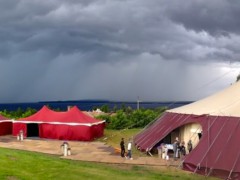Going Organic: What is Holding Vietnam Back?
This article was originally drafted by Indochina Research for the newsletter “I-Light” as part of the Rockefeller Foundation’s Searchlight Process. For more Searchlight content on futurechallenges.org, please click here.
Some 60 per cent of Vietnam’s population still makes their living through agriculture. Despite the size of the agricultural sector, however, until recent times food security has been a major concern. Following the American-Vietnamese war, agricultural land was collectivized and a number of factors led to severe food shortages and famine in the early 80’s. To combat this and related economic challenges, in 1986 the Vietnamese government embarked on a program of Doi Moi (economic renovation) – a shift away from collectivization and towards a socialist-oriented market economy. With improved ability to profit from surplus, farmers turned to chemical fertilizers and other agro-chemicals to increase crop yields and thus their livelihoods.
Dragon fruit grows on a farm in Phan Thiet, Binh Thuan province, Vietnam. (By Dragfyre (Own work) [CC-BY-SA-3.0 (http://creativecommons.org/licenses/by-sa/3.0)], via Wikimedia Commons)
Widespread and unregulated use of chemicals, however, brought their own set of issues. Farmers suffered negative health effects due to their exposure to agro-chemicals and in the mid-1990s, a series of food scares resulted from excessive levels of residual chemicals detected in a range of produce.
These incidents coupled with a number of food poisoning outbreaks raised awareness amongst consumers of the importance of food safety. In the interest of public safety, the national government issued temporary regulations on safe vegetable production in 1998: an initiative that was picked up by provincial and district authorities in the form of training courses in integrated pest management (IPM), safe vegetable growing practices, and related fields.
Despite the growing awareness amongst key stakeholders of the benefit of organic agricultural practices for growers, consumers and the environment, and the opportunity of increased profit margins for organic produce against non-organic, there is only one certified organic farm currently operating in Vietnam.
It is a joint venture between Dr. Nguyen Ba Hung – Vietnam’s leading organic farming expert – and John and Arlene Fast, an expatriate couple who had originally intended to set up a dairy near the city of Da Lat in the central highlands of Vietnam. Founded in 2003, the Organik farm has since received GAP (Switzerland) and HACCEP (Netherlands) certification, allowing the farm to export its produce to Europe. Increase in domestic demand, however, now means that all their produce is sold to hotels, restaurants and individual consumers within Vietnam. The demand for organic vegetables now far outstrips domestic and export supply, so what is holding Organik back from expanding and from other farms seeking certification?
First and foremost is the lack of suitable land. To grow organic, the land must be free of chemical residue – a state that may take up to seven years of the land lying fallow to achieve. The land must similarly be free of the intrusion of chemicals via run off from neighboring farms, contaminated water supply or other external forces. In a densely populated country such as Vietnam, land that meets these requirements can be difficult to find. Competing demands have pushed land prices ever higher, resulting in potentially suitable land being out of the purchasing reach of most farmers. With the very low margins on fresh vegetable production, the average annual income for farmers is not high – around USD$440 on average, yet this income is vital to their economic survival. Without some kind of support, it is not economically viable for farmers to let their land lie fallow while they wait for the soil to return to a chemically virgin state in order to embrace organic production.

Source: http://theblondeabroad.com/wp-content/uploads/2012/02/IMG_5796.jpg
As has been shown in numerous past development initiatives, however, long-term income support is not sustainable. Without some kind of replacement activity, farmers who are recipients of income support may become deskilled, de-motivated and disinclined to return to working their land once the seven years is up. Government programs to educate farmers on safe farming practices have been enthusiastically received. A natural extension of such programs may be to provide opportunities for farmers to become educated in organic farming practices and how to maintain healthy crop yields, while their land is recovering from former use of agro-chemicals. Instruction on marketing and business management during this time may further assist in the successful transition to organic farming.
Another major obstacle for those wishing to undertake organic farming is the complex and costly certification process. Vietnam does not currently have its own internal organic certification, although a set of organic standards has been in development since 2004. External certifications – such as those obtained by Organik farm – are costly and time consuming to obtain. Some of the cost may be addressed using an internal control system (ICS), in which the certification applies to a group of farms managed by a central body which ensures compliance to the organic standards. Nonetheless, a domestic yet internationally recognized certification would ease the path for many farmers who may be thinking about going organic.


